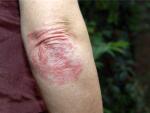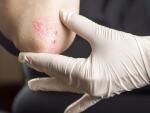
Psoriasis is an autoimmune disease that causes patches of raised, red, scaly skin to develop. These painful and itchy patches, or plaques, can show up anywhere on the skin, even on the genitals. Genital psoriasis often appears as inverse psoriasis—smooth, dry, red lesions most often found in the creases and folds of the skin in your most intimate areas, including the penis, vagina, vulva, buttocks, inner thighs, and the surrounding areas. A National Psoriasis Foundation study reports almost one-third of people with psoriasis claim it makes intimacy challenging, regardless of where your skin is affected.
Many people living with genital psoriasis may avoid sex altogether or are reluctant to get involved in romantic relationships because they’re afraid they could become sexual. Genital psoriasis is not contagious and cannot be spread sexually or by any other physical contact, but many people aren’t aware of the nuances. Some of the most common challenges to intimacy include:
Pain: Nearly half of people with genital psoriasis report sex is more painful because of their psoriasis. Sexual activity during a psoriasis flare-up can even cause bleeding and a burning sensation in affected areas.
Triggers: In one study, a third of patients with genital psoriasis stated that intercourse caused psoriasis flare-ups and made the condition worse. Rubbing and friction involved in sexual activity can irritate skin and cause symptoms to develop.
Lack of confidence: It can be difficult to feel comfortable about your body when you have a psoriasis flare-up, especially in intimate areas.
Anxiety: Potential partners might mistake genital psoriasis for a sexually transmitted disease (STD), and it can be stressful to explain this without ruining “the mood.”
There are several steps to take to overcome these obstacles to intimacy. First, talk to your dermatologist about your symptoms so you can start the right treatment. It’s also important you learn how to care for your skin to reduce symptoms before, during, and after sexual activity. Additionally, make uncomfortable conversations easier by practicing how to explain your psoriasis in advance.
Like with all relationships, honest communication is key. Talking about genital psoriasis might be a little scary, but it’s the best way to build a supportive and trusting relationship. If it feels right, consider bringing up your psoriasis at the start of a new relationship, so you don’t feel the stress of keeping a secret.
The good news is that this kind of clear, open communication builds a stronger relationship at a deeper level. When you find the right partner who’s accepting of the challenges, you’ll end up in a relationship that’s very caring and sympathetic.
You can have a wonderful intimate and sexual relationship despite genital psoriasis, if you keep some things in mind:
Follow your physician’s advice carefully, especially when it comes to medications. For example, some topical products can irritate sensitive skin around the genitals.
Keep your genital area clean using mild cleansers without scrubs or perfumes. Always cleanse the area after being intimate and reapply psoriasis medications.
Be clear with your partner that psoriasis isn’t contagious and let them know how it affects your life and daily activities.
Use lubricant during intimate contact to protect your skin. Be sure to choose one that’s natural and non-irritating, like coconut oil. Lubricated condoms are recommended for intercourse. Just remember that if you’re using condoms for STD or pregnancy prevention, you shouldn’t use oil-based lubricants because they can damage condoms.
Do whatever you need to do to make yourself feel less self-conscious about your psoriasis. Dim the lights, keep the room dark, keep a few articles of clothing on. The more relaxed and comfortable you feel, the more enjoyable your intimate experience will be.
If you can’t have sex because of a flare-up or discomfort, get creative with your intimacy. Caressing, holding hands, kissing, watching romantic movies, or talking over a great meal are all intimate moments that can bring you closer to your partner. Even if your psoriasis prevents you from enjoying some aspects of sex, it can be a fun challenge to find out what works for both of you given those restrictions.
The most important thing you can do to live a great life with genital psoriasis is work with your doctor to get the right treatment. In addition to medications, your dermatologist can also help you find the psyschological support you need to navigate your intimate relationships and have a fulfilling sex life.






























